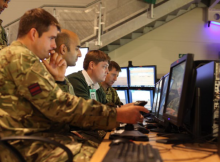Research article on how commercial first person shooters are used for training British Army. #military #training #COTS
Title: Commercial-Off-the-Shelf-Technology in UK Military Training
Authors: John Curry, Tim Price, and Phil Sabin
Published in: Simulation & Gaming 2016, Vol. 47(I) 7-30
Link: http://sag.sagepub.com/content/47/1/7
The research article created by Curry, Price and Sabin describes how British Army uses commercial computer game technology for military training. The article is based on interviews of four staff members and selected documents from the UK Defense Academy. Objective of the study is to record the narrative of the introduction and development of first person shooter games into the British Army.
Normally military training systems are divided into three areas: live simulation with blank ammunition, virtual simulation using computer games, and constructive simulations like board games. This article focuses on the virtual simulation type of training.
The military has been using games for training and decision support for a long time. Computer based strategy games have been used in USA since 1960s. These early strategy games required days for each move making them suitable for war purposes but too slow for effective training. With faster computers since the 80s military around the world has been using computer to assist in military training using purpose build simulators. With the widespread use of personal computers and commercial videogames in the 90s have made computer based military training games increasingly cost-effective.
In modern military training network based computer systems are used for virtual simulation where live troops use simulated equipment in a simulated environment indoors to fight in a computer game. In order to be valuable for training the game must be able to model the required training objectives and provide realistic customizable scenarios while avoiding undesired behavior, e.g. friendly fire should hurt and unnecessary killing of wounded enemies should not be encouraged. Many consumer games have been modified and tried for military training over the years such as Doom, Half-Life and America’s Army. The difficulty in using consumer games has typically related to insufficient customization flexibility and technical limitations.
Currently British Army like many other armies of the world use game Virtual Battle Space 2 (VBS2) for military training. VBS is based on consumer game Operation Flashpoint. The game engine is highly customizable allowing usage of accurate weapon and explosive statistics, terrain creation, and advanced scenario analysis making it highly suitable for military training usage.
Using consumer technology and computer games have many advantages compared to live training such as cost reduction, time saving, and simulation of weapon systems banned from peace time usage. Computer games are not a magic solution or remove the need for live training. Additionally meeting training objectives require user buy-in and proper execution of training. Despite evidence of their effectiveness in certain cases they do not have widespread acceptance in all areas of the training community. Authors believe that game based training offers huge future potential for increasing military training effectiveness especially through cost savings.

Leave a Reply